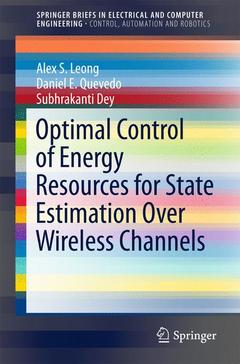Description
Optimal Control of Energy Resources for State Estimation Over Wireless Channels, 1st ed. 2018
SpringerBriefs in Control, Automation and Robotics Series
Authors: Leong Alex S., Quevedo Daniel E., Dey Subhrakanti
Language: English
Subject for Optimal Control of Energy Resources for State Estimation...:
52.74 €
In Print (Delivery period: 15 days).
Add to cartSupport: Print on demand
Description
/li>Contents
/li>Biography
/li>Comment
/li>
This brief introduces wireless communications ideas and techniques into the study of networked control systems. It focuses on state estimation problems in which sensor measurements (or related quantities) are transmitted over wireless links to a central observer.
Wireless communications techniques are used for energy resource management in order to improve the performance of the estimator when transmission occurs over packet dropping links, taking energy use into account explicitly in Kalman filtering and control. The brief allows a reduction in the conservatism of control designs by taking advantage of the assumed.
The brief shows how energy-harvesting-based rechargeable batteries or storage devices can offer significant advantages in the deployment of large-scale wireless sensor and actuator networks by avoiding the cost-prohibitive task of battery replacement and allowing self-sustaining sensor to be operation. In contrast with research on energy harvesting largely focused on resource allocation for wireless communication systems design, this brief optimizes estimation objectives such as minimizing the expected estimation error covariance. The resulting power control problems are often stochastic control problems which take into account both system and channel dynamics. The authors show how to pose and solve such design problems using dynamic programming techniques.Researchers and graduate students studying networked control systems will find this brief a helpful source of new ideas and research approaches.
Alex S. Leong was born in Macau in 1980. He received the B.S. degree in mathematics and B.E. degree in electrical engineering in 2003, and the Ph.D. degree in electrical engineering in 2008, all from the University of Melbourne, Australia. He is currently a Research Associate at the University of Paderborn, Germany. He was with the Department of Electrical and Electronic Engineering at the University of Melbourne from 2008 to 2015. His research interests include networked control systems, signal processing for sensor networks, and statistical signal processing. Dr. Leong was the recipient of the L. R. East Medal from Engineers Australia in 2003, an Australian Postdoctoral Fellowship from the Australian Research Council in 2009, and a Discovery Early Career Researcher Award from the Australian Research Council in 2012.
Daniel E. Quevedo holds the Chair in Automatic Control (Regelungs- und Automatisierungstechnik) at Paderborn University, Germany. He received Ingeniero Civil Electronico and M.Sc. degrees from the Universidad Tecnica Federico Santa Maria, Chile, in 2000. In 2005, he was awarded the Ph.D. degree from The University of Newcastle, Australia. Dr. Quevedo was supported by a full scholarship from the alumni association during his time at the Universidad Tecnica Federico Santa Maria and received several university-wide prizes upon graduating. He received the IEEE Conference on Decision and Control Best Student Paper Award in 2003 and was also a finalist in 2002. In 2009 he was awarded a five-year Research Fellowship from the Australian Research Council. Prof. Quevedo is Editor of the International Journal of Robust and Nonlinear Control and serves as Chair of the IEEE Control Systems Society Technical Committee on Networks & Communication Systems. His research interests are in automatic control, signal processing, and power electronics.
Subhranki Dey was born in India in 1968. He received the B.Tech. and M.Tech. degrees from the DepartmentIntroduces the benefits of wireless communications techniques to the study of networked control systems
Shows the reader how power control may be used to mitigate the effects of fading channels in the remote estimation of dynamical systems
Broadens the reader's arsenal of design methods by considering energy-harvesting sensors and resource allocation improvement with optimized estimation objectives
Includes supplementary material: sn.pub/extras




